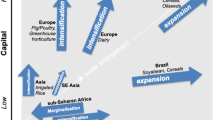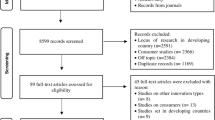Abstract
The agroecological transition of agriculture not only requires changes in practices but also in ways of thinking and in their underlying values. Agroecology proposes broad scientific principles that need to be adapted to the singularities of each farm. This contextualization leads to the identification of agroecological practices that work locally and could serve as evidence-based practices to be transferred to local practitioners. This strategy was tested in a 4-year experiment conducted with dairy-sheep farmers in the South of France. The aim was to collectively engage in the agroecological transition. Our work focused on the creation of a diagnostic tool that was used to analyze local farms and identify virtuous practices to be promoted locally as evidence-based practices. But this strategy came up against the complexity and singularity of the situations to be transformed: not only was no evidence found but the construction of the diagnostic tool itself led to controversy concerning the models of agriculture to be promoted. The experiment then took a pragmatic turn: on-farm workshops were organized to enable farmers to benefit from the professional judgment of peer farmers who were willing to help their colleagues accomplish their agroecological transition. The diagnostic tool, which was designed to be prescriptive, was then used to judge the social acceptability of solutions that made sense in each farmer’s own situation. Our experiment led us to conclude that managing the agro-ecological transition of farmers and their farming system is better conceived as a value-based process than as an evidence-based one.




Similar content being viewed by others
Abbreviations
- AVEM:
-
Association Vétérinaires Eleveurs du Millavois
- CETA:
-
Centre d’Etude et Technique Agricole
- EBITDA:
-
Earnings Before Interests, Taxes, Depreciation and Amortization
- EM:
-
Equivalent Milk
- EF:
-
Equivalent Fuel
- FAO:
-
Food and Agriculture Organization [United Nations]
- INRAE:
-
Institut National de Recherche pour l’Agriculture, l’alimentation et l’Environnement
References
Anderson, Colin R., Chris Maughan, and Michel P. Pimbert. 2018. Transformative agroecology learning in Europe: Building consciousness, skills and collective capacity for food sovereignty. Agriculture and Human Values. https://doi.org/10.1007/s10460-018-9894-0.
Ansell, Christopher K., and Martin Bartenberger. 2016. Varieties of experimentalism. Ecological Economics. https://doi.org/10.1016/j.ecolecon.2016.05.016.
Barrios, Edmundo, Barbara Gemmill-herren, Abram Bicksler, Ronnie Brathwaite, Soren Moller, and Caterina Batello. 2020. The 10 Elements of Agroecology: Enabling transitions towards sustainable agriculture and food systems through visual narratives. Ecosystems and People. https://doi.org/10.1080/26395916.2020.1808705.
Biesta, Gert J. J. 2007. Why “what works” won’t work: Evidence-based practice and the democratic deficit in educational research. Educational Theory. https://doi.org/10.1111/j.1741-5446.2006.00241.x.
Biesta, Gert J. J. 2010. Why ‘what works’ still won’t work: from evidence-based education to value-based education. Studies in Philosophy and Education. https://doi.org/10.1007/s11217-010-9191-x.
Bossel, Hartmut. 1996. Deriving indicators of sustainable development. Environmental Modeling & Assessment. https://doi.org/10.1007/bf01872150.
Callon, M., P. Lascoumes, and Y. Barthe. 2009. Acting in an Uncertain World: An Essay on Technical Democracy. Cambridge: MIT Press.
Chambers, Robert. 2021. Knowledge systems for inclusively responsible food and agriculture. In Rethinking Food and Agriculture, ed. Ammir Kassam and Laila Kassam, 353–369. Cambridge: Woodhead Publishing.
Christiansen, Gwen, Jean Simonneaux, and Laurent Hazard. 2018. Agroecological transition: human skills and social life matter for local actors. In 13th European International Farming Systems Association (IFSA) Symposium, Farming systems: facing uncertainties and enhancing opportunities, 1–5 July 2018, 1–16 ref 45. Chania, Greece. hal-02737548
Coquil, Xavier, Marianne Cerf, Caroline Auricoste, Alexandre Joannon, Flore Barcellini, Patrice Cayre, Marie Chizallet, et al. 2018. Questioning the work of farmers, advisors, teachers and researchers in agro-ecological transition. A review. Agronomy for Sustainable Development. https://doi.org/10.1007/s13593-018-0524-4.
Davoudi, Simin. 2006. Evidence-Based Planning. disP—The Planning Review. https://doi.org/10.1080/02513625.2006.10556951.
De Schutter, Olivier. 2014. Report on the Right to Food: Final Report: the Transformative Potential of the Right to Food. Report to the 25th Session of the Human Rights Council HRC/25/57, January, New York, USA: UN
Dewey, John. 1925. Experience and nature. Chicago: Open Court Publishing Co.
Dewey, John. 1938. Logic: The theory of inquiry. New York: Irvington Publishers.
Duru, Michel, Olivier Therond, and M.’hand Fares. 2015. Designing agroecological transitions, A review. Agronomy for Sustainable Development. https://doi.org/10.1007/s13593-015-0318-x.
Francis, Charles A., Geir Lieblein, Stephen R. Gliessman, Santa Cruz, and Lennart Salomonsson. 2003. Agroecology : The Ecology of Food Systems Agroecology : The Ecology of Food Systems. Journal of Sustainable Agriculture. https://doi.org/10.1300/J064v22n03.
Gliessman, Stephen R. 1990. Agroecology - Researching the Ecological Basis for Sustainable Agriculture. New York: Springer-Verlag. https://doi.org/10.1007/978-1-4612-3252-0.
Gliessman, Stephen R. 2020. Transforming food and agriculture systems with agroecology. Agriculture and Human Values. https://doi.org/10.1007/s10460-020-10058-0.
Green, Lawrence W. 2008. Making research relevant : If it is an evidence-based practice, where’s the practice-based evidence ? Family Practice. https://doi.org/10.1093/fampra/cmn055.
Guile, David. 2019. The concept of “recontextualization” : Implications for professional, vocational and workplace learning. Learning, Culture and Social Interaction. https://doi.org/10.1016/j.lcsi.2019.100343.
Hatchuel, Armand, and Benoit Weil. 1995. Experts in Organizations—A Knowledge-based Perspective on Organizational Change. Berlin, New-York: Walter de Gruyter.
Hazard, Laurent, M. Cerf, C. Lamine, D. Magda, and P. Steyaert. 2020. A tool for reflecting on research stances to support sustainability transitions. Nature Sustainability. https://doi.org/10.1038/s41893-019-0440-x.
Hill, Stuart. 1985. Redesigning the Food System for Sustainability. Alternatives 12: 32–36.
Jeantet, Alain. 1998. Les objets intermédiaires dans la conception. Éléments pour une sociologie des processus de conception. Sociologie Du Travail 3: 291–316.
Kemmis, Stephen. 2010. What is to be done? The place of action research. Educational Action Research. https://doi.org/10.1080/09650792.2010.524745.
Lacombe, Camille, Nathalie Couix, and Laurent Hazard. 2018. Designing agroecological farming systems with farmers: A review. Agricultural Systems. https://doi.org/10.1016/j.agsy.2018.06.014.
Lacombe, C, N Couix, and L Hazard. 2016. Participatory design of agroecological farming systems needs to match the collective goal of transformation with farmers’ professional projects. 12. European IFSA Symposium : Social and technological transformation of farming systems: Diverging and converging pathways, Jul 2016, Edgmond, United Kingdom. 148 p. hal-01607929
Lane, David A., and Martin Down. 2010. The art of managing for the future: Leadership of turbulence. Management Decision. https://doi.org/10.1108/00251741011041328.
Loorbach, Derk. 2010. Transition management for sustainable development: A prescriptive, complexity-based governance framework. Governance. https://doi.org/10.1111/j.1468-0491.2009.01471.x.
Lorino, Philippe. 2018. Inquiry: the process of thinking, acting, and mediating. In Pragmatism and organization studies, ed. P. Lorino, 94–123. Oxford: Oxford University Press.
Luederitz, Christopher, Niko Schäpke, Arnim Wiek, Daniel J. Lang, Matthias Bergmann, Joannette J. Bos, Sarah Burch, et al. 2017. Learning through evaluation—A tentative evaluative scheme for sustainability transition experiments. Journal of Cleaner Production. https://doi.org/10.1016/j.jclepro.2016.09.005.
Miller, Thaddeus R. 2013. Constructing sustainability science: Emerging perspectives and research trajectories. Sustainability Science. https://doi.org/10.1007/s11625-012-0180-6.
Noulhianne, Xavier. 2016. Le ménage des champs. Chronique d’un éleveur au XXIème siècle. Editions du bout de la ville. ISBN 979-10-91108-03-4.
Röling, Niels, and Janice Jiggins. 1994. Policy paradigm for sustainable farming. European Journal of Agricultural Education and Extension. https://doi.org/10.1080/13892249485300041.
Sackett, David L., Scott W. Richardson, William M. Rosenberg, and Brian R. Haynes. 1997. Evidence based medicine. How to practice and teach it. New York: Churchill Livingstone.
Shackelford, Gorm E., Rodd Kelsey, William J. Sutherland, Christina M. Kennedy, Stephen A. Wood, Sasha Gennet, Daniel S. Karp, et al. 2019. Evidence synthesis as the basis for decision analysis : A method of selecting the best agricultural practices for multiple ecosystem services. Frontiers in sustainable food systems. https://doi.org/10.3389/fsufs.2019.00083.
Slavin, Robert E. 2002. Evidence-based education policies: transforming educational practice and research. Educational Researcher. https://doi.org/10.3102/0013189X031007015.
Stoker, Gerry, and Peter John. 2009. Design experiments: Engaging policy makers in the search for evidence about what works. Political Studies. https://doi.org/10.1111/j.1467-9248.2008.00756.x.
Thenard, Vincent, Jérémie. Jost, Jean Pierre Choisis, and Marie-Angelina. Magne. 2014. Applying agroecological principles to redesign and to assess dairy sheep farming systems. Options Méditerranéennes, Série a: Séminaires Méditerranéens 109: 785–789.
Tittonell, Pablo. 2014. Ecological intensification of agriculture-sustainable by nature. Current Opinion in Environmental Sustainability. https://doi.org/10.1016/j.cosust.2014.08.006.
Tittonell, Pablo A. 2013. Farming systems ecology : towards ecological intensification of world agriculture. Wageningen Universiteit. https://edepot.wur.nl/258457.
Voß, Jan-Peter, and René Kemp. 2005. Reflexive Governance for Sustainable Development—Incorporating feedback in social problem solving. In 6th International Conference of the European Society for Ecological Economics, 1–31. Lisbon, Portugal.
Wittmayer, Julia M., and Niko Schäpke. 2014. Action, research and participation: Roles of researchers in sustainability transitions. Sustainability Science. https://doi.org/10.1007/s11625-014-0258-4.
Acknowledgements
We thank the Association Eleveurs Vétérinaires du Millavois and the partners of the SALSA project for their cooperation in this work.
Funding
This work was funded by the Fondation de France, by the Conseil Régional Occitanie (PSDR ATARI) and by the DIVERSIFOOD European research (Grant Agreement No. 633571).
Author information
Authors and Affiliations
Contributions
All three authors participated in the experiment. C.L. designed and led the redesign phase of the farms. She wrote the chronicle of the project. L.H. proposed the analytical framework. The analyses were performed by all three authors. The writing and revision processes were led by L.H.
Corresponding author
Ethics declarations
Conflict of interest
The authors declare that they have no conflict of interest.
Additional information
Publisher's Note
Springer Nature remains neutral with regard to jurisdictional claims in published maps and institutional affiliations.
Rights and permissions
About this article
Cite this article
Hazard, L., Couix, N. & Lacombe, C. From evidence to value-based transition: the agroecological redesign of farming systems. Agric Hum Values 39, 405–416 (2022). https://doi.org/10.1007/s10460-021-10258-2
Accepted:
Published:
Issue Date:
DOI: https://doi.org/10.1007/s10460-021-10258-2




